|
|
|
Sort Order |
|
|
|
Items / Page
|
|
|
|
|
|
|
| Srl | Item |
| 1 |
ID:
062305
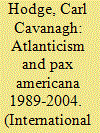

|
|
|
|
|
| Publication |
Winter 2004-05.
|
|
|
|
|
|
|
|
|
|
|
|
|
|
|
|
| 2 |
ID:
112088
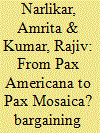

|
|
|
|
|
| Publication |
2012.
|
| Summary/Abstract |
While the economic rise of new powers, frequently identified as the 'BRICs' (Brazil, Russia, India, and China), has been dramatic, the implications of this emerging multipolarity for global economic governance are not clear. In this paper, we address the question: can the diffusion of power among a greater diversity of countries result in the creation of a new global economic order-a Pax Mosaica-to succeed the Pax Americana of the previous century? Our argument proceeds in four steps. First, we provide a brief overview of the achievements and limitations of the system that was established at the end of World War II, and lasted for over half a century in the form of Pax Americana. In the second section, we investigate the emergence of multipolarity, and highlight the opportunities and costs that this generates. In the third section, we explore the routes whereby the changing balance of power might be harnessed towards the creation of a Pax Mosaica. We do so by posing four sets of questions, which must be answered if the mosaic distribution of power is to lead to greater economic stability, growth, and peace. The fourth section concludes the paper with ideas for reform with reference to the World Trade Organization, the Bretton Woods institutions, and the G20.
|
|
|
|
|
|
|
|
|
|
|
|
|
|
|
|
| 3 |
ID:
086398
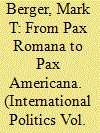

|
|
|
|
|
| Publication |
2009.
|
| Summary/Abstract |
This review paper focuses on the most recent cycle in the debate about the history and future of the 'New American Empire,' both in relation to the rise and fall of the Roman Empire specifically, and against the wider backdrop of the extensive debate about the US position in the changing global order more generally. It argues that much of the literature, including some of the books under review, rest on a misreading of history (Roman or otherwise) and a flawed grasp of the fate of the American ascendancy in relation to the contemporary crisis of the nation-state system and the far from unexpected boom-bust cycles of 'genuinely existing' liberal capitalism (globalization) in the twenty-first century. The washout on Wall Street in the latter part of 2008 could only come as a surprise to those who have not been paying attention to the vicissitudes of 'genuinely existing' liberal capitalism over the past 30 years or more. The paper argues that the American ascendancy, contrary to much of the contemporary prognostication, remains in its prime and Pax Americana will only begin a downward spiral when it has been successfully challenged and displace by an equally powerful and systemic alternative. In the meantime, the New American Empire, especially under new leadership, looks set to continue and even flourish.
|
|
|
|
|
|
|
|
|
|
|
|
|
|
|
|
| 4 |
ID:
149433


|
|
|
|
|
| Summary/Abstract |
By analyzing Turkey’s relations with Great Britain and the US in a period of drastic change (1929–47), this article argues that the origins of the shift in the orientation of Turkish foreign policy from Pax Britannica to Pax Americana not only affected the perceptions and strategies of relevant powers, but also entailed a dynamic interactive process. It asserts that the transition featured aspects of significant change, as well as continuity for the region. It demonstrates that while attempting to bandwagon with the relatively stronger naval, military, and economic partner, Turkey also endeavored to pursue a more autonomous foreign policy at various stages of this transition.
|
|
|
|
|
|
|
|
|
|
|
|
|
|
|
|
| 5 |
ID:
132390


|
|
|
|
|
| Publication |
2014.
|
| Summary/Abstract |
The ongoing reallocation of wealth and power from the West to the "rising rest" promises to produce a new pecking order over the course of the next few decades. Although there is a well-developed body of knowledge on the material dimensions of power transitions, existing scholarship provides a much more embryonic intellectual foundation on the normative dimensions of international change. Transitions in the international distribution of power produce not only novel hierarchies, but also novel brands of international order that rest on the social and ideological proclivities of newly powerful states in the system. This article explores the normative dimensions of hegemony by examining the geopolitical, socioeconomic, cultural, and commercial logics that inform different orders. The normative foundations of hegemony are studied across four great powers: the Ottoman Empire, Imperial China, Great Britain, and the United States. The cases reveal that as great powers rise, they as a matter of course seek to push outward to their expanding spheres of influence the norms that provide order within their own polities. Accordingly, today's emerging powers will not embrace the existing international order erected during the West's watch. On the contrary, China and other rising powers will seek to fashion alternative orders based on their own cultural, ideological, and socioeconomic trajectories. If the next international system is to be characterized by a rules-based order rather than competitive anarchy, it will require a new normative consensus that rests on toleration of ideological and political diversity.
|
|
|
|
|
|
|
|
|
|
|
|
|
|
|
|
| 6 |
ID:
159667


|
|
|
|
|
| Summary/Abstract |
I will begin with a declaration that might once have been provocative but may today be received as a statement of simple fact: the American World Order is collapsing.
The symptoms of crisis are unavoidable. Let’s start with the most obvious. Last November, the American people elected Donald Trump. Trump is a longstanding critic of international commitments. As long ago as 1987, he published in The New York Times a paid advertisement, in which he disparaged America’s military alliances as a waste of money.
|
|
|
|
|
|
|
|
|
|
|
|
|
|
|
|
| 7 |
ID:
066347
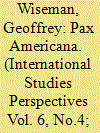

|
|
|
| 8 |
ID:
174432


|
|
|
|
|
| Summary/Abstract |
This article provides an assessment of three decades of US hegemony over the Arab-majority states of the Middle East's Gulf region. Since its direct military intervention in the 1990 war over Kuwait, the US increasingly engaged itself as an architect forging the region through deployment of its neoliberal economic and financial coercion, Janus-faced support for authoritarian regimes while promoting democracy, human rights and individual freedom rhetorically, as well as repeated direct military interventions into Arab states in an effort to bring about regime change. At the base of diplomatic and public justification for the 1990–91 intervention—or the Gulf War as it became known to Americans—was the assertion that the war was defensive in nature, protecting the territorial integrity of Kuwait as well as the enshrining the norms of non-intervention and the sanctity of borders. Over the following years, however, US military forces came to be active in Iraq, Syria, Yemen and Libya with an expanded coterie of bases littered across the states of the Gulf (Saudi Arabia, Kuwait, Bahrain, Qatar, UAE and Oman). While the US and its allies had been engaged in the region's politics throughout the Cold War, from 1990 through 2019, the US escalated its role to preside over regional politics through a hub-and-spoke latticework of relations between itself and regional states. From the perspective of nearly three decades since 1990, an appraisal of this coercive relationship, focusing on the humanitarian impacts it has wrought upon the region's peoples, suggests it has failed according to these criteria. Many of the region's peoples have experienced a marked decline in their economic well-being, personal safety and health, while the state apparatuses established following the retreat of European imperialism now lie in ruin in Iraq, Libya, Syria and Yemen. The populations of these states now face a precarious future, without the protection of state institutions, against a range of predatory actors. Moreover, these actions have contributed toward the decline of US global influence, thereby encouraging further change in an environment where popular sovereignty and inputs into governance by regional peoples has been frustrated through the exercise of US power.
|
|
|
|
|
|
|
|
|
|
|
|
|
|
|
|
| 9 |
ID:
080100


|
|
|
| 10 |
ID:
065895
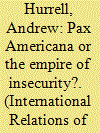

|
|
|
| 11 |
ID:
174624


|
|
|
|
|
| Summary/Abstract |
On May 15, 1984, the countries in Europe had largely managed to remain at peace with each other for the longest continuous stretch of time since the days of the Roman Empire. 1 That rather amazing record has been further extended—by now, the continent may well be experiencing the longest period (75 years) free from substantial interstate war since Europe itself was invented as a concept some 2,500 years ago.
|
|
|
|
|
|
|
|
|
|
|
|
|
|
|
|
| 12 |
ID:
053244


|
|
|
| 13 |
ID:
056889


|
|
|
| 14 |
ID:
106955
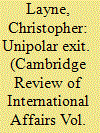

|
|
|
|
|
| Publication |
2011.
|
| Summary/Abstract |
In this article I show that the unipolar era already is drawing to a close. Three main drivers explain the impending end of the Pax Americana. First, the rise of new great powers-especially China-is transforming the international system from unipolarity to multipolarity. Second, the United States is becoming the poster child for strategic over-extension, or as Paul Kennedy dubbed it, imperial overstretch. Third, the United States' relative economic power is declining, and mounting US fiscal problems and the dollar's increasingly problematic role as the international financial system's reserve currency are undermining US hegemony. After examining how these trends undermine the argument for 'unipolar stability', I conclude by arguing that over the next two decades the Pax Americana's end presages dramatic changes in international politics.
|
|
|
|
|
|
|
|
|
|
|
|
|
|
|
|
| 15 |
ID:
159468
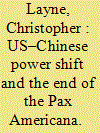

|
|
|
|
|
| Summary/Abstract |
In this article, I show that far from consenting to be bound by institutions and rules of the Pax Americana, China is already working to recast the international order in ways that favour its interests, not those of the United States. The US foreign policy establishment does not grasp this, and, instead, has invested the idea of a ‘rules-based, institutionalized’ international order with a talismanic quality. It claims that rules and institutions are politically neutral, and, ipso facto, beneficial for all. However, in international politics, who rules makes the rules. Rules and institutions reflect the distribution of power in the international system. A power transition is taking place in the early twenty-first century: US power is in relative decline and China is rising quickly. No international order—not even the Pax Americana—lasts forever. The liberal world order cannot survive the erosion of US hegemonic power. It is this structural change, not Donald Trump, that threatens the post-Second Word War international order's survival. It requires a huge leap of faith to believe that a risen China will continue to subordinate itself to the Pax Americana.
|
|
|
|
|
|
|
|
|
|
|
|
|
|
|
|
|
|
|
|
|